by [email protected] | Jul 10, 2024 | Elevating Practice Owner Confidence
Podcast: Play in new window | Download
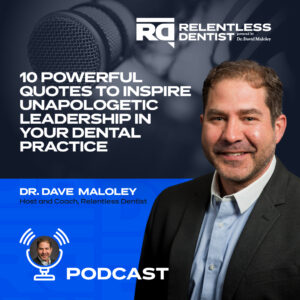 Feeling overwhelmed by the constant need to please everyone in your dental practice?
Feeling overwhelmed by the constant need to please everyone in your dental practice?
Discover how unapologetic leadership can transform your practice and reignite your passion.
- Unlock the Secret to Conflict Resolution: Learn why addressing conflicts head-on can create a more harmonious and productive work environment.
- Embrace Authentic Leadership: Find out how leading with authenticity builds trust and inspires your team to bring their best selves to work.
- Master the Art of Assertiveness: Get practical tips on setting boundaries and taking decisive action that benefits your practice and your team.
Join Dr. Dave as he shares actionable insights to help you lead with confidence and authenticity. Listen now and start transforming your leadership confidence today!
Are you ready to upgrade your practice? Need help implementing the Dentists Ascend Method? Don’t miss Dr. Dave’s presentation: ‘How to Build a Referral-Centric, High-Profit Dental Practice Without the Team Drama — Even if You’re Currently Overwhelmed.‘ This resource is tailored to help you enhance your operations, boost patient referrals, and increase profits while creating a self-managing team. Perfect for any dental practice owner looking to win in today’s challenging environment. Check it out now!
Key Quotes:
- “If you avoid conflict to keep the peace, you start a war inside yourself.”
- “When you lead with authenticity, you encourage your team to bring their true selves to work as well.”
- “True positivity balances hope with practicality.”
- “The reality is you usually know what the right thing to do is. Unfortunately, it’s rarely the easy choice.”
- “I strongly believe that part of your vision should be to become the best place to work in town.”
- “Most people don’t know what good assertive communication looks like. And so part of your role as a leader is to teach them and challenge them to be more assertive and more candid.”
- “If you do just one thing right as a leader, it’s the change you want to see in your team.”
Featured on the Show:
- People: Mark Manson, is a bestselling author known for his unconventional and blunt approach to self-help. His book “The Subtle Art of Not Giving a F*ck” challenges traditional notions of happiness and success, emphasizing the importance of accepting limitations and focusing on what truly matters.
- People: Brené Brown, is a researcher, author, and speaker who has spent decades studying vulnerability, courage, empathy, and shame. Known for her captivating TED Talk “The Power of Vulnerability,” Brown’s work challenges us to embrace vulnerability as a path to deeper connection and authentic living.
- People: Steve Jobs, was a visionary leader in the technology industry, best known as the co-founder of Apple Inc. He was a pioneer of the personal computer revolution and a master of design and innovation.
- People: Ralph Waldo Emerson, was an American essayist, poet, and philosopher who championed individualism and self-reliance. A leading figure in the Transcendentalist movement, he emphasized intuition and spiritual connection over established dogma.
- People: Eleanor Roosevelt, FDR’s wife who redefined the First Lady role, championed human rights, and helped shape the Universal Declaration of Human Rights.
- People: Rosalynn Carter, Former First Lady (1977-1981) known for her advocacy for mental health and championing women’s rights. Wife of President Jimmy Carter, she actively partnered with him and continues humanitarian work through The Carter Center.
- People: Tom Landry, a coaching icon, led the Dallas Cowboys for 29 seasons. He secured two Super Bowl victories and revolutionized defense with the 4-3 scheme.
- People: Jack Welch, was a transformative business leader known for his turnaround of General Electric (GE) as CEO from 1981 to 2001. He championed “brutal honesty” and performance-driven cultures, boosting GE’s market value from $13 billion to $400 billion.
- People: Margaret Thatcher, is a trailblazing British politician who defied expectations to become the country’s first female Prime Minister (1979-1990). Earning the nickname “Iron Lady” for her unwavering resolve, she implemented conservative economic policies and championed individual responsibility.
- Book: The Courage to Be Disliked: How to Free Yourself, Change your Life and Achieve Real Happiness, Ichiro Kishimi, Fumitake Koga
- Publication: Harvard Business Review, is a leading source of management thinking for business professionals worldwide.
- Publication: McKinsey Reports, are in-depth research publications produced by McKinsey & Company, a global management consulting firm. These reports offer data-driven insights and analysis on a wide range of topics impacting business, economics, and society.
- Publication: HR Magazine, is a leading publication for senior HR professionals and business leaders. It provides in-depth insights, best practices, and strategic information on all aspects of human resources management.
- Publication: Inc Magazine, is your go-to resource for entrepreneurs, startup founders, and business owners. It provides practical advice, inspiring stories, and actionable strategies to help you launch, grow, and lead your business.
- Place: Dressler’s, is a family-owned and operated establishment with a focus on Southern cuisine and a commitment to exceptional service.
- I appreciate your feedback. Let me know what you learned and loved here: [email protected].


by [email protected] | Jul 3, 2024 | Elevating Practice Owner Confidence
Podcast: Play in new window | Download
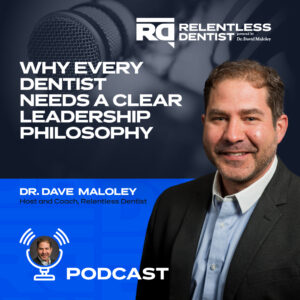 Why do some dental practices prosper while others struggle?
Why do some dental practices prosper while others struggle?
The secret often lies in a clear and compelling leadership philosophy.
Join Dr. Dave to discover how defining your philosophy can immediately upgrade your practice.
- Foundation for Success: Understand why a well-defined leadership philosophy is essential for guiding your team and creating a cohesive, motivated, and high-performing work environment, illustrated by John Wooden’s Pyramid of Success.
- Overcome Chaos and Burnout: Learn how a clear leadership vision can streamline operations, reduce inefficiencies, and prevent burnout among your team members.
- Inspire and Engage Your Team: Discover practical steps to articulate and implement your leadership philosophy, ensuring your team is aligned, inspired, and committed to delivering exceptional patient care.
Don’t miss out on this episode of the Relentless Dentist Podcast!
Tune in now to learn how a clear leadership philosophy can elevate your practice to new heights of excellence.
Are you ready to upgrade your practice? Need help implementing the Dentists Ascend Method? Don’t miss Dr. Dave’s presentation: ‘How to Build a Referral-Centric, High-Profit Dental Practice Without the Team Drama — Even if You’re Currently Overwhelmed.‘ This resource is tailored to help you enhance your operations, boost patient referrals, and increase profits while creating a self-managing team. Perfect for any dental practice owner looking to win in today’s challenging environment. Check it out now!
Key Quotes:
- “Leadership in a dental practice goes far beyond making decisions and giving directions. It’s really about inspiring a team, setting a vision, and cultivating a culture that drives the operation toward success and excellence.
- “A clear leadership philosophy provides direction and vision. It fosters cohesion and collaboration within the team. It serves as a powerful motivator for you. It engages team members and encourages that culture of learning and innovation, ensuring the practice remains competitive and forward-thinking.”
- “My personal leadership philosophy is really simple. It’s growth. We grow the business by growing the people. And in my dental practice, if you thought you were a finished product, we weren’t going to work together for very long…”
- “When I hired somebody, I let them know that job one wasn’t taking care of patients. It was a kind and supportive team member.”
- “A strong team spirit leads to a supportive and unified work environment. And you know what that means? More productivity, less turnover.”
Featured on the Show:
- People: John Wooden, A legendary American college basketball coach for UCLA. Wooden is credited with leading the UCLA Bruins to an unprecedented ten NCAA national championships in twelve years, including a record seven in a row (1967-1973). He is also celebrated for his philosophy on coaching and life, which transcended basketball and emphasized personal development, teamwork, and the pursuit of excellence.
- People: Bill Walton, a towering redhead, carved his name into basketball history. He led UCLA to NCAA glory twice, then brought his dominance to the NBA, even earning a league MVP title. Despite battling injuries, his impact on the game remains undeniable.
- I appreciate your feedback. Let me know what you learned and loved here: [email protected].


by [email protected] | Jun 26, 2024 | Elevating Practice Owner Confidence
Podcast: Play in new window | Download
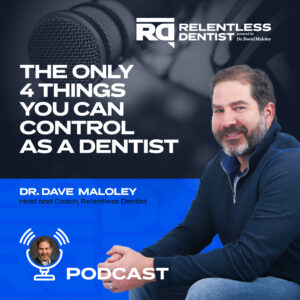 Are you wasting time and energy trying to control the uncontrollable?
Are you wasting time and energy trying to control the uncontrollable?
Join Dr. Dave as he reveals a powerful framework to help you cut through the chaos and achieve peak performance both professionally and personally.
In This Episode, You’ll Discover:
- The 4 Key Elements for Controllability: Transform yourself with purpose, presence, positivity, and performance.
- Actionable Insights: Practical tips to implement these principles today, reducing overwhelm and increasing clarity.
- Comprehensive Confidence Building: Lead with assurance, inspire trust, and enrich your personal relationships.
Ready to transform your leadership, dental practice, and life? Tune in now to discover how these four elements can help you become the confident leader your team, patients, and loved ones deserve.
Are you ready to upgrade your practice? Need help implementing the Dentists Ascend Method? Don’t miss Dr. Dave’s presentation: ‘How to Build a Referral-Centric, High-Profit Dental Practice Without the Team Drama — Even if You’re Currently Overwhelmed.‘ This resource is tailored to help you enhance your operations, boost patient referrals, and increase profits while creating a self-managing team. Perfect for any dental practice owner looking to win in today’s challenging environment. Check it out now!
Key Quotes:
- “By honing in on four key elements—purpose, presence, positivity, and performance—you can unlock a powerful transformation personally and professionally.”
- “Presence is really all about mindfulness…and your ability to tune out distractions in a very distracted world.”
- “A positive mindset can transform how you approach daily tasks and interact with your team and patients… leading to increased motivation and collaboration.”
- “In our world, the world of dentistry, it’s all about combining your physical well-being with purposeful actions.”
- “When we take care of our bodies and plan our actions thoughtfully, we set ourselves up for success in every area of our lives.”
- “Try incorporating centering breath into your routine. Take a few minutes to breathe deeply and refocus before your huddle, before you see the next patient before you have a difficult conversation with a team member.”
Featured on the Show:
- People: Winston Churchill, a British statesman, orator, and Nobel Prize-winning author, best known for his leadership as Prime Minister of the United Kingdom during World War II.
- People: Robert Emmons, a leading researcher in positive psychology, Professor Emeritus at the University of California, Davis, and author of influential books on gratitude and its impact on happiness and well-being.
- People: Michael McCullough, a professor of psychology at the University of Miami, is known for his research on gratitude, forgiveness, and their positive effects on social and emotional well-being.
- Publication: Frontiers in Psychology Journal, a leading open-access scientific journal publishing peer-reviewed research across various fields of psychology.
- I appreciate your feedback. Let me know what you learned and loved here: [email protected].


by [email protected] | Jun 19, 2024 | Enjoying Cash Flow
Podcast: Play in new window | Download
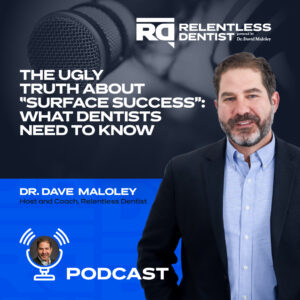 Is your pursuit of success leaving you feeling drained and disconnected?
Is your pursuit of success leaving you feeling drained and disconnected?
In this eye-opening episode, Dr. Dave reveals the harsh reality behind “surface success” and its hidden costs.
- Unmasking Surface Success: Understand why financial milestones and external praise aren’t enough and may actually be harming your personal and professional life.
- Deep Winning Defined: Discover how to align your practice with your core values, ensuring fulfillment and harmony in both your career and personal life.
- Practical Strategies: Learn actionable steps to build a high-profit, low-stress practice that enriches your life and the lives of those around you.
Transform your approach to success, strengthen your relationships, and boost your practice’s efficiency.
Listen now to uncover the secrets to achieving meaningful success and a fulfilling dental practice. Don’t miss out—your journey to true success starts here!
Are you ready to upgrade your practice? Need help implementing the Dentists Ascend Method? Don’t miss Dr. Dave’s presentation: ‘How to Build a Referral-Centric, High-Profit Dental Practice Without the Team Drama — Even if You’re Currently Overwhelmed.‘ This resource is tailored to help you enhance your operations, boost patient referrals, and increase profits while creating a self-managing team. Perfect for any dental practice owner looking to win in today’s challenging environment. Check it out now!
Key Quotes:
- “If it makes you a worse person, it’s not success. If starting a business tears your relationships apart, and makes you feel bitter or frustrated with people, then it doesn’t matter how much money it makes or external praise it receives. That’s not success.”
- “Dentistry should be about helping patients, building meaningful relationships, and creating a positive impact on your community.”
- “Don’t chase surface success. It leads to burnout, strained relationships, and a hollow sense of achievement.”
- “When your practice is in values alignment, everything changes because we reduce friction. You and your team are playing to your strengths. You’re fostering an environment where everyone thrives.”
- “Deep winners are here for all of it… They don’t live in the delusion that life should be ups without the downs.”
Featured on the Show:
- People: Ryan Holiday, a writer and media strategist, left college at 19 to apprentice under marketing guru Robert Greene. He then built a successful marketing career and founded Brass Check, a creative agency. Holiday is also a bestselling author known for his books on stoicism and personal growth.
- People: Seth Godin, is a prolific writer and teacher who has spent over 30 years inspiring people to “level up” through his writing, courses, and projects. He’s a bestselling author with 20 books translated into nearly 40 languages, and the founder of the altMBA, a life-changing marketing workshop. Godin is passionate about igniting ideas and helping people make a difference in the world.
- I appreciate your feedback. Let me know what you learned and loved here: [email protected].


by [email protected] | Jun 12, 2024 | Enthusing Clients
Podcast: Play in new window | Download
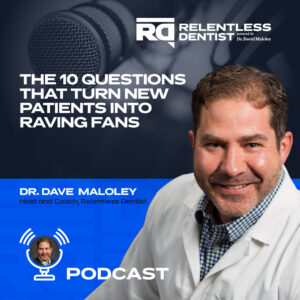 Ever wondered why some patients turn into raving fans while others never return?
Ever wondered why some patients turn into raving fans while others never return?
Dr. Dave shares the secret to building unwavering patient loyalty with just the right questions.
- Unleash Trust: Find out how a simple question can set the stage for a trusting relationship from the first visit.
- Understand Their Needs: Learn the strategic approach to uncover what truly matters to your patients and tailor your care.
- Forge Lasting Bonds: Discover how to create deeper connections that turn one-time visits into lifelong partnerships.
Ready to enhance patient loyalty and accelerate your word-of-mouth referrals?
Tune in now and start transforming first-time visits into lifelong partnerships.
Listen today and lead the way!
Are you ready to upgrade your practice? Need help implementing the Dentists Ascend Method? Don’t miss Dr. Dave’s presentation: ‘How to Build a Referral-Centric, High-Profit Dental Practice Without the Team Drama — Even if You’re Currently Overwhelmed.‘ This resource is tailored to help you enhance your operations, boost patient referrals, and increase profits while creating a self-managing team. Perfect for any dental practice owner looking to win in today’s challenging environment. Check it out now!
Key Quotes:
- “A key to unlocking patient loyalty and transforming our practice lies in asking the right questions and truly listening to the answers.”
- “You should be obsessed about this question [how did you hear about our practice?] and the information that is gathered from this question because understanding how patients discover your practice is really a treasure trove of insights.”
- “Connecting with their patients beyond their dental needs is essential for building trust and loyalty.”
- “Immediate feedback after appointments allows you to identify areas for improvement and continuously enhance the patient experience.”
- “By asking about their experience right after their visit, you gain invaluable insights into what went well and what could be improved.”
Featured on the Show:
- People: Henry David Thoreau, is an American essayist, poet, and philosopher. He was a leading figure in Transcendentalism. He is renowned for his work Walden, a reflection on simple living in nature, and his essay “Civil Disobedience,” an argument for civil liberties.
- People: Maya Angelou, a literary icon, penned the groundbreaking memoir “I Know Why the Caged Bird Sings.” A poet, actress, and activist, she championed civil rights and empowered with words like “Phenomenal Woman.”
- I appreciate your feedback. Let me know what you learned and loved here: [email protected].


by [email protected] | Jun 5, 2024 | Enhancing Culture
Podcast: Play in new window | Download
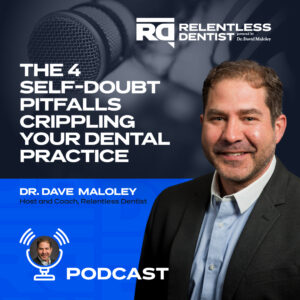 Are you secretly battling self-doubt in your dental practice?
Are you secretly battling self-doubt in your dental practice?
Today, Dr. Dave exposes the hidden confidence killers and arms you with the tools to overcome them to improve your culture.
- Identify Hidden Pitfalls: Discover the four self-doubt pitfalls silently eroding your team’s potential and practice success.
- Implement Actionable Strategies: Learn ten actionable strategies to build a more confident, resilient team and boost overall morale.
- Transform Self-Doubt: Find out how to turn self-doubt into a driving force for success with proven techniques.
Tune in now and start your journey to a more confident, high-performing practice.
Are you ready to upgrade your practice? Need help implementing the Dentists Ascend Method? Don’t miss Dr. Dave’s presentation: ‘How to Build a Referral-Centric, High-Profit Dental Practice Without the Team Drama — Even if You’re Currently Overwhelmed.‘ This resource is tailored to help you enhance your operations, boost patient referrals, and increase profits while creating a self-managing team. Perfect for any dental practice owner looking to win in today’s challenging environment. Check it out now!
Key Quotes:
- “Self-doubt is a silent saboteur. It quietly erodes confidence and creates a ripple effect that impacts your entire practice culture.”
- “Self-sabotage occurs when people undermine their own chances of success… It can be in the relationships at work, it can be their own personal performance at work…”
- “Feeling inadequate and unworthy despite persistent effort and goal achievement can lead to a never-ending cycle of dissatisfaction.”
- “Create an environment where feedback is seen as a tool for growth, not a threat. Offer specific, actionable, and supportive feedback regularly.”
- “As a leader, demonstrate the behaviors you want to see in your team. Be the change you want to see in the world. Show confidence, and show resilience and openness in dealing with self-doubt.”
Featured on the Show:
- People: Benjamin Franklin, was a Founding Father, statesman, inventor, and writer. He played a key role in the American Revolution, securing French support. His scientific work included groundbreaking electricity experiments and inventions like the lightning rod. He is also known for his witty “Poor Richard’s Almanack.”
- People: Carol Dweck, is a Stanford psychologist known for her research on mindset and motivation, and author of the bestselling book “Mindset: The New Psychology of Success.” Her work explores how our beliefs about our abilities influence our success and well-being.
- People: Barbara Corcoran, is an American entrepreneur, real estate mogul, and television personality. She founded The Corcoran Group, a leading New York City real estate brokerage, and achieved great success before selling it for $66 million. Corcoran is also a well-known investor on ABC’s “Shark Tank,” where she shares her business savvy and provides aspiring entrepreneurs with valuable guidance.
- People: Albert Schweitzer, was an Alsatian theologian, philosopher, physician, and musician. He won the 1952 Nobel Peace Prize for his “Reverence for Life” philosophy, exemplified by his founding of the Albert Schweitzer Hospital in Africa. A scholar of Bach’s music, he also influenced the Organ Reform Movement.
- I appreciate your feedback. Let me know what you learned and loved here: [email protected].


by [email protected] | May 29, 2024 | Elevating Practice Owner Confidence
Podcast: Play in new window | Download
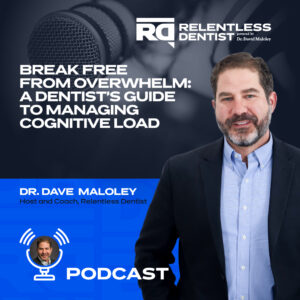 Are you drowning in daily decisions and endless tasks in your dental practice?
Are you drowning in daily decisions and endless tasks in your dental practice?
Discover how cognitive load theory and liberating constraints can revolutionize your workflow and enhance your productivity.
- Unlock Hidden Potential: Learn how reducing decision fatigue and simplifying routines can dramatically improve your performance and reduce stress.
- Streamline for Success: Discover practical steps to eliminate unnecessary tasks and focus on high-value activities that truly matter to your practice.
- Enhance Productivity: Understand how managing cognitive load can lead to a more fulfilling and productive work environment, making your practice a place of continuous improvement and growth.
Ready to optimize your dental practice?
Tune in now to uncover actionable strategies that will help you reduce stress, enhance productivity, and create a practice that runs smoothly and is highly profitable.
Are you ready to upgrade your practice? Need help implementing the Dentists Ascend Method? Don’t miss Dr. Dave’s presentation: ‘How to Build a Referral-Centric, High-Profit Dental Practice Without the Team Drama — Even if You’re Currently Overwhelmed.‘ This resource is tailored to help you enhance your operations, boost patient referrals, and increase profits while creating a self-managing team. Perfect for any dental practice owner looking to win in today’s challenging environment. Check it out now!
Key Quotes:
- “Cognitive load theory is based on the idea that our working memory has limited capacity. When we overload it with too much information and too many tasks at once, our performance begins to suffer.”
- “Use technology to automate repetitive and time-consuming tasks… Automation reduces the cognitive load associated with managing these tasks manually.”
- “Standardize routine procedures with checklists and protocols. This will not only ensure consistency but it also reduces the cognitive effort required to remember every step of the process.”
- “Focus your mental energy on activities that directly contribute to your practice’s success and your professional growth.”
- “Periodically review your workload and your productivity. Reflect on what’s working and what isn’t and be willing to adjust your strategies accordingly.”
Featured on the Show:
- People: Michael Phelps, is a retired American swimmer and the most decorated Olympian of all time, with 28 medals, including a record 23 golds. He made history at the 2008 Beijing Olympics by winning eight gold medals, the most by any athlete in a single Olympic Games.
- People: Bob Bowman, is an American swimming coach known for coaching 23-time Olympic gold medalist Michael Phelps. He currently leads the Arizona State Sun Devils swimming and diving teams and was the head coach for the US swim team at the 2016 Rio Olympics. Bowman also authored “The Golden Rules.”
- People: John Sweller, is an Australian educational psychologist, Emeritus Professor at the University of New South Wales, and the developer of the influential cognitive load theory, which has greatly impacted instructional design and learning theories.
- People: Cal Newport, is a computer science professor at Georgetown University and a New York Times bestselling author known for coining the term “deep work,” which he explores in his book “Deep Work: Rules for Focused Success in a Distracted World.” Deep work emphasizes the importance of focusing intently on cognitively demanding tasks to enhance creativity and problem-solving.
- People: Atul Gawande, is a renowned American surgeon, writer, and public health researcher, known for his influential books on medical practice. His notable work, “The Checklist Manifesto: How to Get Things Right,” explores how checklists can enhance efficiency and safety in medicine, business, and disaster recovery.
- I appreciate your feedback. Let me know what you learned and loved here: [email protected].


by [email protected] | May 22, 2024 | Enjoying Cash Flow
Podcast: Play in new window | Download
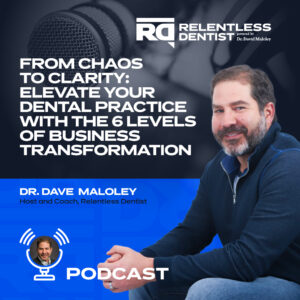 Feeling overwhelmed by endless issues and inefficiencies?
Feeling overwhelmed by endless issues and inefficiencies?
Exhausted from putting out fires every day without seeing lasting change?
Join Dr. Dave as he reveals a powerful framework to gain leverage, focus, and transform your dental practice.
- Increase Profits: Discover the six levels of business transformation to unlock your practice’s full potential.
- Reduce Overhead: Apply Robert Dilts’ logical levels for sustainable, high-impact changes.
- Gain Free Time: Implement actionable steps to streamline operations, boost morale, and enhance patient satisfaction.
Tune in to learn how you can elevate your practice, achieve more profits, lower overhead, and enjoy increased free time.
Are you ready to upgrade your practice? Need help implementing the Dentists Ascend Method? Don’t miss Dr. Dave’s presentation: ‘How to Build a Referral-Centric, High-Profit Dental Practice Without the Team Drama — Even if You’re Currently Overwhelmed.‘ This resource is tailored to help you enhance your operations, boost patient referrals, and increase profits while creating a self-managing team. Perfect for any dental practice owner looking to win in today’s challenging environment. Check it out now!
Key Quotes:
- “We get more leverage at the top of the pyramid because changes at the higher levels create a cascading effect down through the lower levels. So as an example, you’re gonna get the least yield changing the environment. You’re gonna get the most yield focusing on beliefs, identity, purpose for you and your team.”
- “A cluttered, outdated office can stress both patients and staff, hindering productivity and satisfaction. Small changes like improving lighting, updating equipment, and creating a more organized workspace is going to make a big difference.”
- “As a leader, model the behaviors you want to see. Punctuality, attentiveness, and proactive problem-solving are just some examples. Set clear expectations and provide regular feedback to help your team improve their own day-to-day interactions.”
- “In your dental practice, ensuring that everyone, from the front desk to the hygienist, is well-trained and competent, including their people skills, boosts confidence and allows for more effective patient care.”
- “As a leader, cultivate a mindset of abundance and possibility. Challenge limiting beliefs that hold your practice back.”
Featured on the Show:
- People: Robert Dilts, is a leading expert and pioneer in the field of Neuro-Linguistic Programming (NLP), having been involved since its creation in 1975. He is a renowned author, trainer, and consultant, known for his contributions to NLP techniques and applications. Dilts has a global reputation and has worked with individuals and organizations worldwide.
- I appreciate your feedback. Let me know what you learned and loved here: [email protected].


by [email protected] | May 15, 2024 | Enthusing Clients
Podcast: Play in new window | Download
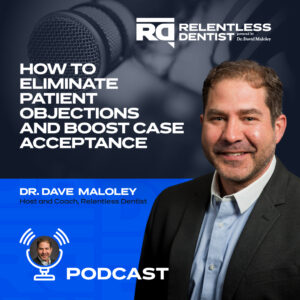 Ever wonder why some dental treatments are immediately accepted by patients while others face hesitation?
Ever wonder why some dental treatments are immediately accepted by patients while others face hesitation?
Dive into the secrets of preempting and eliminating patient objections in your dental practice with Dr. Dave!
- Unearth the Six Pillars of Trust: Discover how strategic communication, emotional resonance, tailored experiences, transparency, competency, and engagement transform your patient interactions and boost treatment acceptance.
- From Soil to Bloom: Learn why Dr. Dave compares the treatment acceptance process to preparing a fertile garden, and how you can apply these principles to cultivate a thriving practice.
- Eliminate Doubts Before They Arise: Explore techniques to address and remove patient objections even before they surface, ensuring a smoother treatment proposal process.
Tap play now to transform your approach and see your case acceptance rates soar! Don’t miss out on these practice-changing insights.
Are you ready to upgrade your practice? Need help implementing the Dentists Ascend Method? Don’t miss Dr. Dave’s presentation: ‘How to Build a Referral-Centric, High-Profit Dental Practice Without the Team Drama — Even if You’re Currently Overwhelmed.‘ This resource is tailored to help you enhance your operations, boost patient referrals, and increase profits while creating a self-managing team. Perfect for any dental practice owner looking to win in today’s challenging environment. Check it out now!
Key Quotes:
- “Just like in gardening, where you can’t expect to plant seeds in unprepared soil and see them thrive, in dentistry, we can’t expect to propose treatments without first cultivating a foundation of trust and understanding with our patients.”
- “The cost of ignoring this groundwork isn’t just a missed opportunity for treatment, it’s a potential erosion of patient relationships and ultimately the health of your practice.”
- “Education in your dental practice goes beyond the mere transmission of knowledge… It’s about connecting on an emotional level, human to human.”
- “Every patient walks into your office with unique needs and preferences, right? Your job is to tailor the dental experience to fit them as near perfectly as possible.”
- “Trust is the cornerstone of effective dental practice today, and transparency is the foundation.”
Featured on the Show:
- Publication: Edelman Trust and Health Report, is an annual analysis of public trust in the healthcare industry, examining factors that influence trust, its impact on health outcomes, and the role of communication in building trust between patients and healthcare providers.
- I appreciate your feedback. Let me know what you learned and loved here: [email protected].


by [email protected] | May 8, 2024 | Enhancing Culture
Podcast: Play in new window | Download
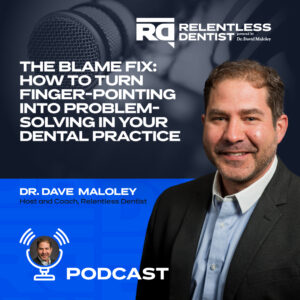 Is your dental team tangled in the typical blame and gossip?
Is your dental team tangled in the typical blame and gossip?
Join us as we unravel the mystery behind why so many dental practices find themselves ensnared below the line and explore the transformative power of ascending to an Above-the-Line Culture.
In this episode, you’ll:
- Uncover Below the Line Dynamics: Explore the reasons behind the prevalence of below-the-line cultures in dental practices and their detrimental impact on practice efficiency.
- Chart Your Path to Above the Line: Follow Dr. Dave as he shares practical steps for cultivating an above-the-line culture, including team training and fostering open discussions.
- Harvest the Benefits: Learn about the tangible benefits of embracing an Above-the-Line Culture, from enhancing patient care to boosting overall job satisfaction among team members.
Don’t miss this enlightening episode filled with strategies to enhance your dental practice dynamics.
Ready to revolutionize your team’s approach and elevate patient experiences? Hit play now!
Are you ready to upgrade your practice? Need help implementing the Dentists Ascend Method? Don’t miss Dr. Dave’s presentation: ‘How to Build a Referral-Centric, High-Profit Dental Practice Without the Team Drama — Even if You’re Currently Overwhelmed.‘ This resource is tailored to help you enhance your operations, boost patient referrals, and increase profits while creating a self-managing team. Perfect for any dental practice owner looking to win in today’s challenging environment. Check it out now!
Key Quotes:
- “It’s imperative that we’re cognizant of where we stand in any moment of time, above the line or below the line, because our position is going to set the tone for the entire team.”
- “Rather than external factors beyond your reach, focus on those [things you can control]. This approach isn’t just about avoiding negative behaviors. It’s about actively cultivating a culture where every team member feels secure, valued, and understood.”
- “Blame is a natural and normal reaction because it comes from our instinctual defense mechanisms…But while blame might offer temporary relief from those uncomfortable feelings, it’s inherently toxic…it creates an environment where fear, defensiveness, and lack of accountability will thrive.”
- “Positive reinforcement will encourage the team to continue engaging in these powerful behaviors.”
- “Gossip…severely undermines trust and disrupts team cohesion…By enforcing a policy where negative topics must only be discussed with those who can contribute to a solution, you encourage direct, candid communication…creating a more positive and productive work environment.”
Featured on the Show:
- People: Jim Dethmer, is a celebrated coach, speaker, and co-founder of The Conscious Leadership Group, known for his work with CEOs and their teams. He leads forums and coach training in major cities and co-authored the bestseller “The 15 Commitments of Conscious Leadership,” focusing on enhancing organizational cultures through conscious leadership principles.
- I appreciate your feedback. Let me know what you learned and loved here: [email protected].


 Feeling overwhelmed by the constant need to please everyone in your dental practice?
Feeling overwhelmed by the constant need to please everyone in your dental practice?


 Why do some dental practices prosper while others struggle?
Why do some dental practices prosper while others struggle? Are you wasting time and energy trying to control the uncontrollable?
Are you wasting time and energy trying to control the uncontrollable? Is your pursuit of success leaving you feeling drained and disconnected?
Is your pursuit of success leaving you feeling drained and disconnected? Ever wondered why some patients turn into raving fans while others never return?
Ever wondered why some patients turn into raving fans while others never return? Are you secretly battling self-doubt in your dental practice?
Are you secretly battling self-doubt in your dental practice? Are you drowning in daily decisions and endless tasks in your dental practice?
Are you drowning in daily decisions and endless tasks in your dental practice? Feeling overwhelmed by endless issues and inefficiencies?
Feeling overwhelmed by endless issues and inefficiencies? Ever wonder why some dental treatments are immediately accepted by patients while others face hesitation?
Ever wonder why some dental treatments are immediately accepted by patients while others face hesitation? Is your dental team tangled in the typical blame and gossip?
Is your dental team tangled in the typical blame and gossip?